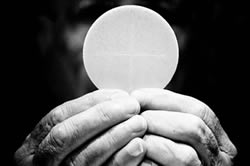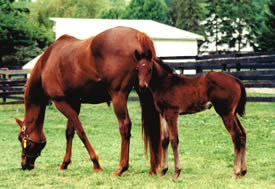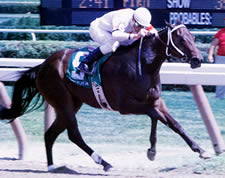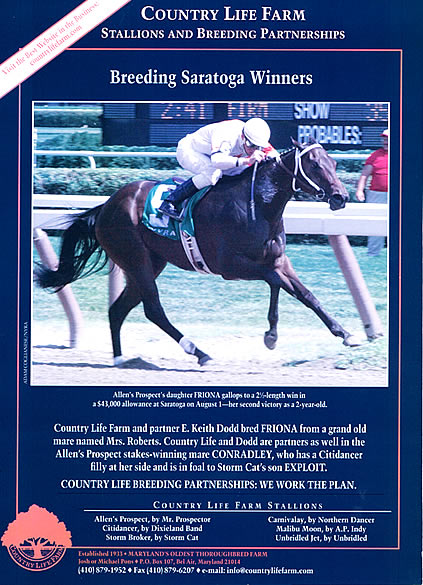
In the Anglican/Episcopalian Eucharist service, just before the bread and wine are presented to the people, the Celebrant "breaks the consecrated Bread" by elevating the host and breaking it, saying:
[Alleluia.] Christ our Passover is sacrificed for us;
and the people respond:
Therefore let us keep the feast. [Alleluia.]In the 1970 Book of Common Prayer, Holy Eucharist Rite II, page 364.
(The "Alleluia" omitted during Lent.)
At first reading or hearing, the verb "is" seems a typo, poor grammar, or implication of an actual, repeated sacrifice. In a presentation about the liturgy, a priest and liturgical scholar pointed out that the verb usage here is not any of these mistaken impressions. I don't have the exact explanation, and I know my recollection doesn't capture the full theological significance of what was said. What I recall, however, is that the verb defines a specific, one-time event that transcends time and in a sense is ongoing. It happened (Christ's sacrifice on the cross) long ago, but it is still a sacrifice for us today ... and will be tomorrow.
I remember the priest talking about some verb tense details, which my chemistry academic background didn't prepare me to understand. (I recall a term, perhaps "present progressive subjective mood" or something like that.) But my gist of it is that the Eucharist's "Christ is Sacrificed" is not a repetition of Christ's sacrifice, not an addition, and more than a commemoration. It is more like an active participation in the here and now.
In similar manner, at Easter, we use the greeting, "Christ Is Risen!" with the proper refrain, "He Is Risen, Indeed!" Not "was risen" Of course, the resurection was 2000 years ago, but to us it is an IS!
This Reflection is not intended to be an exercise in esoteric verb conjugation. Nor do I think I could ever do justice to the what is probably the deep theological meanings behind the "Christ IS Sacrificed" phrase. However, I do think there is something in using this "active-type" verb to give walking-around meaning for us in our Ordinary Time.
Speaker, author, and pastor Tony Campolo seems to capture what I sense has such a meaning in a term he uses, "Eternalized Moments." He describes special moments that he knows would stay with him ... as in the present ... even if he could live for a million years. "That moment was lifted out of time and eternalized."A Reasonable Faith: Responding to Secularism, Tony Campolo, 1983, p. 118.
While Campolo's Eternalized Moment probably only scratches the surface of the meaning in "Christ is Sacrificed," the term can be meaningful to us as we reflect on our lives. The use of an active, present tense verb can eternalize certain moments. "I accept Christ!" seems to transcend the moment I was dunked in the baptismal pool. It's not only a "was", but also an "is", and (I hope) a "will be". There are probably others, such as, "I marry Rose". Not all are positive, uplifting events: "My friend David dies in hospice." Perhaps some such moments are so negative that we wish we could undo their Eternalization.
These Eternalized Moments are more than mere memories. They are moments that live with us, become a part of us. We feel them with all our senses and emotions. The smiles, laughs, and, yes, the tears and fears of those moments remain present with us. Perhaps these Eternalized Moments even help define us.
Ok, what does this have to do with: My Filly Win a Stakes Race in 2001?
In an earlier life, we were involved with Thoroughbred horses, mainly on the breeding side of the business. Early on, I noticed jockeys using what seemed poor grammar when in interviews one might say something like, "I win on Mr. Phipps' filly last summer at Saratoga." Or, "I win two nice prep races on this colt leading to tomorrow's Derby." At first I chalked up the grammar to usually Spanish-speaking jockeys not too fluent in English. But, then I noticed well-schooled trainers and erudite owners using this same grammar: "My home-bred mare win a Grade I stakes at Belmont!"
Although I never did find anyone to explain this weird grammar thing ("That's just what they say," was the only explanation), I've decided that the usage is kind of this Eternalized Moment idea. And it is very appropriate. In the world of Thoroughbred racing, a win is a rare thing. It is a very humbling sport. After a win, you rarely see a jockey, trainer, owner, or breeder boast or pound their chest like those in many other sports. They know the hard road, the sweat, the disappointments that are a part of that rare opportunity to stand in the winner's circle. It is moment that one does eternalize ... it is an ever-living moment.
As a very small-time breeder, I knew the difficult path to a winner's circle. The foal that never made it to the track, the mare who had to be put down because of laminitis before we even had a chance to breed to her, the colt that won but then had to have two long (and costly) layoffs due to injury. It is with a quiet pride that I say, "The filly we bred, Friona, WIN the Critical Miss Stakes at Philadelphia Park, August 25, 2001!"

And, we did not receive even a cent for Friona winning that stakes. (Well, maybe a few bucks on a modest betting wager.) The two-year-old filly wasn't ours. In partnership with our friends at Country Life Farm in Bel Air, Maryland, we owned a mare, Mrs. Roberts, which we bred to one of their stallions Allen's Prospect. Mrs. Roberts foaled a nice bay filly April, 26, 1999, and that November we sold the foal at a Keeneland (Kentucky) sale. The next year, as a yearling she was sold to a large racing operation in Texas, which the next year (2001) named her Friona and raced her as a two-year-old. Prior to the stakes race mentioned, she won (win!) a nice allowance race at Saratoga.
Although at that stakes race we were no longer the filly's owners nor had any financial ties, Country Life/Dodd LLP was and forever is listed as "Breeder of Friona." To stand in any winner's circle is a big deal! To stand in the winner's circle of a stakes race with a horse you bred is a VERY BIG DEAL! A moment that is eternalized!
"Christ IS Sacrificed!", "I accept Christ!", "My filly WIN!" Obviously, there is an order of magnitude of importance and meaning here, but they are Eternalized Moments. Perhaps these can stimulate you to think of your own Eternalized Moments. Those moments that are a part of you and will remain always. If you do and want to share, please send to me at reflections@reflectionsinot.com. With your permission, I might use some in a recap of this Reflection. If you are in any discussion/sharing-type groups, sharing Eternalized Moments might be a meaningful activity.
And, Jesus said, "Lo, I AM with you always."Gospel of Matthew 28:20. Not "I was", not only "I will be"; but, "I AM!"
Of Related Interest
No horse has every won the Kentucky Derby?







